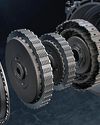يحاول ذهب - حر
EV start-ups up in arms
1st November 2022
|Autocar Professional
Disbursement delays of the FAME II subsidies are seriously impacting cash flows and production schedules of electric two-and three-wheeler start-ups in particular, writes Amit Mohile V.

EV start-ups involved in two-wheeler and three-wheeler production are facing a double whammy. They claim that on the one hand, their cash reserves are dwindling and on the other hand, the huge amounts of FAME II subsidies that they are entitled to are not being paid even though their vehicles are listed as 'active' in the latest FAME II subsidy list.
This non-payment of subsidies for over four months has resulted in discontent brewing among the players. The abrupt halt in subsidies, reportedly in the range of Rs 200 crore to Rs 300 crore, which had been fuelling the production and sales for over a year and half, have forced several start-ups to reduce or modify their production schedules.
The Ministry of Heavy Industry (MHI) that is responsible for the FAME subsidy disbursal maintains that it has been reimbursing the subsidies to the companies and that there has been no delay from their end, a senior official at MHI said. Founders of several e-mobility firms believe that "there is a lot more than what meets the eye". They claim they are being targeted at the legacy manufacturers' behest.
Over 80 percent of smaller manufacturers' cash flows have been severely impacted owing to the non-payment of subsidies, according to the new EV Federation that has been formed (See accompanying box). This is even as large firms - majority of them being the legacy manufacturers - continue to receive subsidies albeit with minor hiccups. Companies like Tata Motors, Mahindra & Mahindra and TVS have confirmed to Autocar Professional that they continue to receive the subsidies.
هذه القصة من طبعة 1st November 2022 من Autocar Professional.
اشترك في Magzter GOLD للوصول إلى آلاف القصص المتميزة المنسقة، وأكثر من 9000 مجلة وصحيفة.
هل أنت مشترك بالفعل؟ تسجيل الدخول
المزيد من القصص من Autocar Professional

Autocar Professional
Spain's Fersa Group invests in India-based Delux Bearings
Besides theRs100 croreinvestment, the Indian company gets access toadvanced technologies and bearings with arange of applications that willhelpinits global growth strategy, writes Manobhava Baruah.
2 mins
15th January 2023

Autocar Professional
Tata Autocomp to open compact dual-clutch transmission plant
Amidthe country’s growing need for personal mobility with easy manoeuvrability, comes the demand for vehicles with automatic transmission. Tata AutoCompisready tomovein writes Shruti Mishra.
3 mins
15th January 2023

Autocar Professional
Pankaj Munjal-backed Hero Motors raises equity from GEF Cap
The company willinvest Rs1,500 crore over thenextthree years andit expects 60 percent ofits turnover to come fromelectric vehicle parts. Itaims to becomea Global EV Solutions Company from India
2 mins
15th January 2023

Autocar Professional
New age thermoplastics for next-generation EV batteries
Saudi-based global materials major SABIChas developed cutting edgein fire-resistant polymers and flame-retardant materials that comply with various EV battery safety standards across the world.
4 mins
15th January 2023

Autocar Professional
Switch Mobility to meet growing e-bus demand with fresh capex
Oncourse for abillion-dollar business, the company is exploringa possibility of operating satellite factories across the country to serve different geographies, write ShahkarAbidi and Ketan Thakkar.
4 mins
15th January 2023

Autocar Professional
Kia India to invest Rs 2,000 crore in EVS, to introduce new e-RV in 2025
New investmentto drive R&D, infrastructure development and manufacturing capabilities. The company willlocally produce EVsin India with possibility of exports as well, writes Mayank Dhingra.
2 mins
15th January 2023

Autocar Professional
"The government has given enough time for indigenisation but the industry has not taken it seriously"
Amitabh Saran, Founder and CEO, Altigreen, shares his views on problems inthe EV industry and battery localisation solutions with Amit Vijay M.
3 mins
15th January 2023

Autocar Professional
TATA MOTORS SEES ONE INTWO CARS SOLDAS EVS BY 2030
The company aims to offer wider choices withnew EVs that may straddle a pricebracket of Rs20to 40lakhinthe coming years, writes Ketan Thakkar.
2 mins
15th January 2023

Autocar Professional
MG Motor India in expansion drive, to invest $100 million
The investment willbe usedtoramp up existing production capacity from1.2to1.4-15lakh units per annum atthe automaker's Halol plantin Gujarat, writes Ketan Thakkar.
2 mins
15th January 2023

Autocar Professional
"Technology and its multiplier effect are driving business transformations and customer experiences"
Technical Centre India is one of Continental’s largest research and development centres in the world, andasa Centre of Competence’ it also develops customised products for the BRIC countries.
9 mins
15th January 2023
Translate
Change font size
